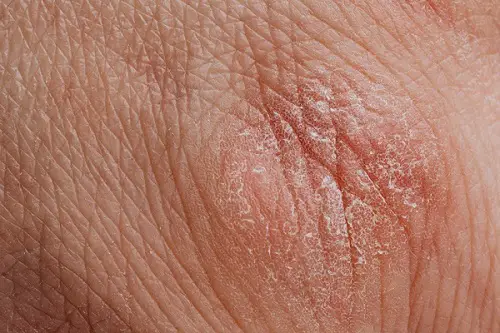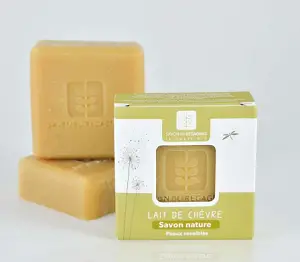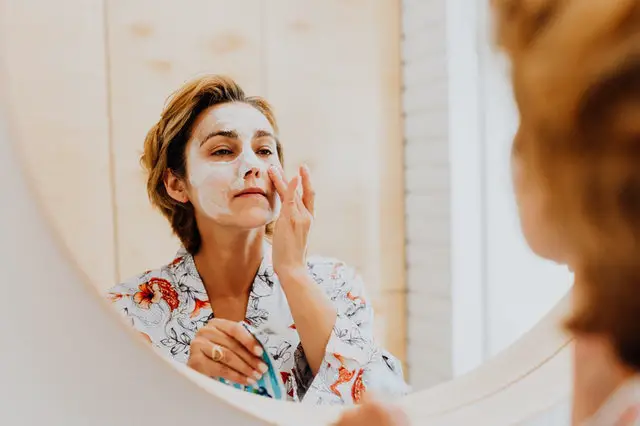Menopause is a period accompanied by hormonal upheavals and many side effects that influence the quality of life. Often unpleasant, we find among them more irritated, more fragile and drier skin. Although it seems to be inevitable, there are effective solutions to prevent or relieve dry skin. This is what we will see today by answering the question: what to do to fight against dry skin during menopause? First, learn why your skin dries up during menopause. Then in a second step, discover the solutions and tips to have less dry skin during menopause.
In this section:
Dry skin at menopause: the causes causing its appearance
Dry skin is distinguished by weakening of the skin's protective barrier (also called the hydrolipidic film) which consists of a fatty substance and a watery substance. This hydrolipidic film works as a skin barrier to maintain the balance of the skin and thus slow down its dryness. To explain it otherwise, dry skin will lack sebum and water. The effects are that the skin is brittle, irritated and sensitive. Often, a dull complexion and feelings of discomfort or tightness are also part of the lot. In rarer cases, the skin may be scaly, rough, or red.

But therefore, what are the factors that cause dry skin during menopause?
Your age and the development of dry skin are of course closely related. Indeed, as you age, the skin gradually loses its protective film and it then becomes drier. At the same time, it encourages the appearance of wrinkles and sagging skin.
So why does the skin gradually lose its protective film? This is partly related to decrease in estrogen hormones and therefore at menopause. These hormones referred to as female hormones are present in the dermal tissue and play a significant role in maintaining the suppleness, hydration and firmness of the skin. When their level is reduced, the skin gradually loses its constitution and hydration. Result: the skin becomes dry around menopause.
As the skin is more sensitive during menopause, aggravating parameters will at the same time upset the balance of the skin and cause even drier skin :
- Climatic conditions (cold, pollution, temperature changes, humidity, wind, sun, etc.).
- Cosmetic products and especially on know which attack and weaken the protective skin film. As a result, the skin will lose moisture and dry out.
- Hygiene of life : smoking, coffee, stress, diet, sleep, alcohol and medication.
What effective solutions to fight against dry skin during menopause?
To prevent or relieve dry skin that occurs during menopause, first, we have to reconstruct the skin hydrolipidic film so as to help it carry out its role of barrier and in this way prevent skin dryness. To do this, you must first nourish your skin with fatty compounds rich in unsaturated fatty acids. Thus, the hydrolipidic film will be restored. Then, it must be hydrated with agents derived from water. It is also very important adopt a good routine for the skin with healthy products and efficient. Finally it will be necessary to have good lifestyle so as to maintain healthy skin.
What cosmetic products to use to take care of your dry skin?
How to wash dry and fragile skin during menopause?
Start by using very mild soaps with neutral pH suitable for the skin of the body and face. These soaps are made to prevent irritating, scouring or drying out sensitive and dry skin. They are formulated from non-drying and non-irritating ingredients.
We suggest you Goat's milk soap from Savonnerie du Regagnas against dry skin during menopause

Why choose it?
![]() Certified organic, it is made without allergens and petrochemical compounds (toxic to the skin).
Certified organic, it is made without allergens and petrochemical compounds (toxic to the skin). ![]() Highly dosed in goat's milk renowned for its extreme softness for dry skin.
Highly dosed in goat's milk renowned for its extreme softness for dry skin. ![]() Suitable for the skin of the body and face.
Suitable for the skin of the body and face.![]() Resulting from a cold saponification, it has only active ingredients from nature that are non-stripping and non-drying for the skin.
Resulting from a cold saponification, it has only active ingredients from nature that are non-stripping and non-drying for the skin.
Which creams are effective for the care of dry skin during menopause?
As stated above, dry skin is lacking in fat and water. To satisfy his desire for fat, you need to adopt a cream that contains lipids, in other words with nourishing active ingredients to be able to restore the hydrolipidic film. The nourishing components that you will find in creams are vegetable oils or vegetable butters. To satisfy its demand for hydration, you will need to adopt a cream formulated with water-derived agents such as, for example, hydrosol, aloe vera or hyaluronic acid.
To explain more simply : the composition of your cream (s) must be closest to the natural protective skin film with an aqueous substance which will fill the need for hydration and a fatty substance which will satisfy the lack of fat.
Be vigilant to systematically adopt a cream with natural active ingredients to take care of dry skin during menopause. Indeed, many creams are formulated on the basis of harmful, irritating, drying substances and resulting from petrochemicals such as sulphates, silicones, parabens, quats, preservatives or synthetic fragrances. In addition to presenting toxic health risks, they may weaken your skin and dry it out even more. In order to make it easier for you to select a good product, we recommend the application INCIbeauty which independently and transparently reviews your beauty products and notifies you whether the product is healthy or not.
- Cream for intense hydration - Jonzac thermal water
- Nourishing balm for ultra dry skin - Druydès
- Nourishing cream for dry and sensitive skin - Fées en Provence
As for the dry skin of the face : The information set out above also applies of course to the skin of the face. The best way to avoid skin dryness is to use a moisturizing cream or serum in the morning (to prevent the oily effect on your skin) coupled with the use of a nourishing cream in the evening after your toilet. In the event that you use an anti-wrinkle cream, distinguish whether it is rather moisturizing (contains agents derived from water: hydrosol, aloe vera, hyaluronic acid) or rather nourishing (has fatty agents such as oils or butters). Depending on the result, adopt a cream capable of meeting the missing need.
- Intense and anti-aging nutrition and hydration day cream - Cerra
- Nourishing body and face cream for dry and sensitive skin - Ibbeo Cosmétiques
- Anti-aging night serum for very dry skin - Realia
Skin dryness during menopause: effective natural products
The oily substance of the skin has the power, among other things, to prevent the evaporation of water and therefore that it does not lack hydration. It therefore acts as a skin protection barrier. For this reason, it is necessary to feed it effectively with fatty ingredients.
The 100% natural products, raw and pure, will be most effective for nourishing very dry skin during menopause. These products are vegetable oils and vegetable butters. They are to be used as a mask on the skin and to be left as such, without having to rinse them. The epidermis will naturally assimilate the product and drink all its properties. Best oils for dry skin are: coconut, wheat germ, argan, sweet almond, avocado, borage and nigella. Regarding vegetable butters, the beurre de karité will be the best one you can find to nourish and restore the imbalance of very dry skin during menopause. This is because it is highly rich in saturated fatty acids, which will allow it to deeply nourish the epidermis and restore the skin's protective film.
Comments : You can also combine your oil with highly hydrating aloe vera gel.
Which skin routine to adopt against dry skin?

If you want take care of your dry skin during menopause, it is essential to adopt a good skin routine. Basic but effective, the following habits will hydrate, nourish and restore the hydrolipidic film of your dry skin:
- Cleanse your skin with cold or lukewarm water every day, morning and evening with a mild soap or moisturizing milk.
- Contrary to what one might think, water used externally is not a source of hydration. Conversely, it dries up the skin. Therefore, avoid cleaning your face with tap water, and prefer a lotion or a mild milk. As for the body, dry yourself systematically when you get out of the shower. And use a moisturizer or nourishing cream after drying yourself off.
- Always remove make-up before sleeping to allow the skin to breathe. To do this, prefer the use of a cleansing milk, a vegetable oil such as sweet almond or a special lotion for dry skin.
- Apply a moisturizing day cream and / or moisturizing serum in the morning.
- Apply a nourishing cream before going to bed.
- Weekly, make a nourishing mask from vegetable oil.
- Moisturize your eye area with a special product for this sensitive part of the face.
Dry skin during menopause: the impact of your lifestyle
In order to take care of the dry skin at menopause, it is very important toadopt good lifestyle habits. Indeed, healthy, problem-free skin is often linked to a healthy body. Thus, bad lifestyle habits, deficiencies or internal concerns will inevitably have repercussions on the condition of your skin. Certain main principles should then be followed to take care of your dry skin:
1 - A good food consumption to have less dry skin during menopause
- Eat healthy and balanced food. It is better to avoid foods rich in saturated fats and refined sugars involved in the production of free radicals and toxins in the body. Conversely, prefer food that contains good fats (vegetable fats). This is because lipids are needed to prevent dry skin during menopause.
- Eat foods rich in antioxidants that prevent premature aging of cells. We recommend the consumption of red fruits which are among the foods richest in antioxidants. Hence, they effectively fight free radicals and skin tissue decline during menopause.
- Eat foods rich in vitamins, trace elements and proteins (the latter which preferably come from plant origin because they are much better for health) which contribute to the good balance of the skin.
2 - Against skin dryness adopt a healthy lifestyle
- Drink at least 1.5L of water per day to sufficiently hydrate your dry skin.
- Try to avoid tobacco as much as possible which is involved in the degradation of the quality of the skin. Toxic products degrade several components of the dermis and prevent irrigation of skin tissue.
- Make sure you protect your skin from the sun's UV rays wearing a cap, scarf or hat and using face sunscreen, certified organic and with the maximum of natural ingredients if possible. This is because sunscreens are filled with chemicals that can also damage your skin.
- Sleep time is important for the body to recover and regenerate. Ideally, you should get about eight hours of sleep per night and a minimum of six hours.







